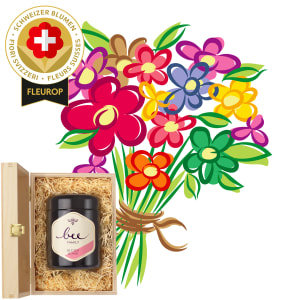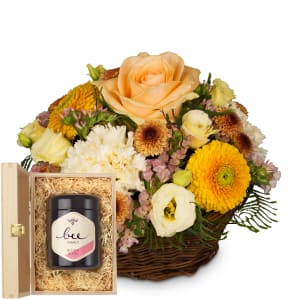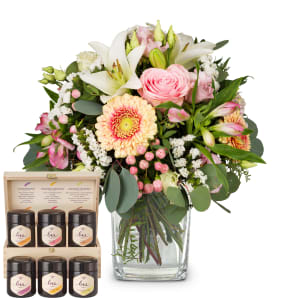Honey from Bee-Family
Want to learn more about an irresistible honey? To dive into the world of honey, honey hunters and bee transhumance and know how to store honey? Read here.

Honey from Bee-Family - high quality and delicious
Honey from Bee-Family is delicious, of high quality, elegantly packaged and help in the war against bee death.
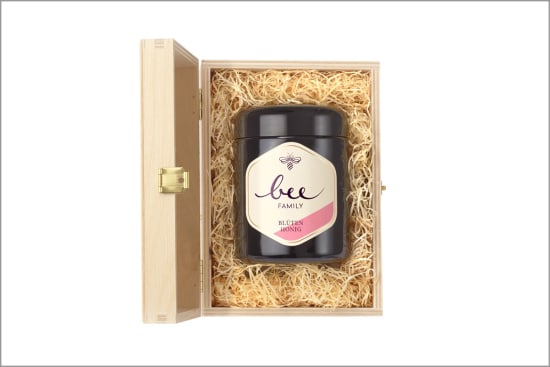
Two gift variants are available:
The jars contain: sunflower honey, Swiss blossom honey, Swiss forest honey, phacelia honey, lime blossom honey and lavender honey.
- A 350 g jar of certified Swiss blossom honey in an elegant gift box.
- Six 70 g pots with six different varieties of honey in an elegant gift box.
The jars contain: sunflower honey, Swiss blossom honey, Swiss forest honey, phacelia honey, lime blossom honey and lavender honey.
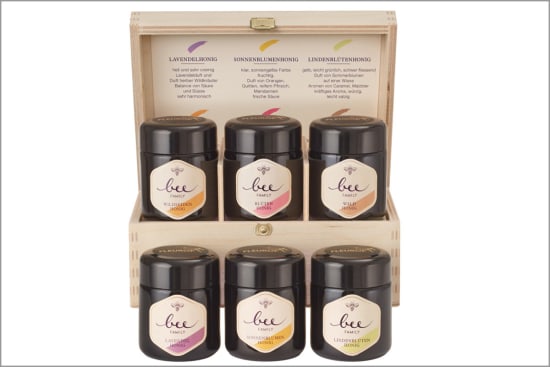
Bee-Family stands for the ethical treatment of nature and of food produced from natural sources.
The company actively champions the keeping and preservation of healthy bee breeds in unspoilt, natural regions.
All the varieties of honey are of impressively high quality, laboratory tested and guaranteed residue-free.
All the varieties of honey are of impressively high quality, laboratory tested and guaranteed residue-free.
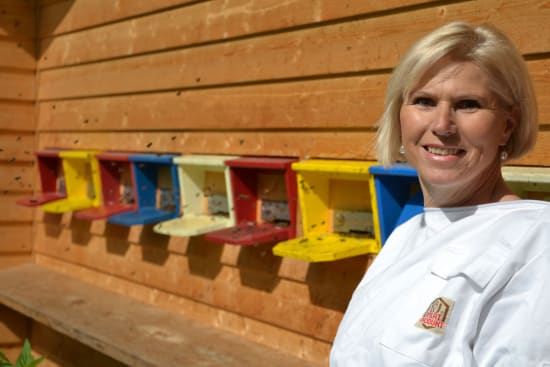
Behind «Bee-Family» is a bee-keeper passionate about her work
The founder of Bee-Family AG is beekeeper Marisa Bühler.
She grew up at Lake Constance and learned to love bee-keeping and Carnica bees as a child at her grandfather’s home in Carinthia.
Later she learned the art of bee-keeping from the ground up and built an apiary in Uzwil. It grew into a major passion.
Later she learned the art of bee-keeping from the ground up and built an apiary in Uzwil. It grew into a major passion.
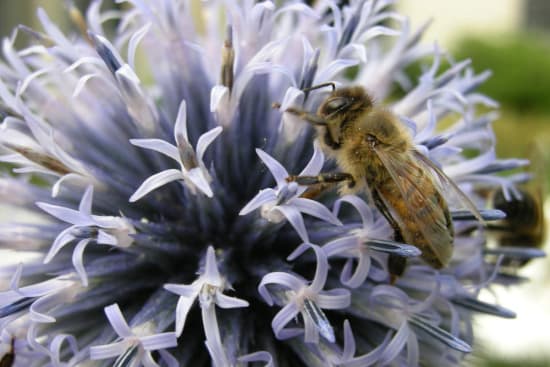
As bee death arose, the realisation also grew that action was needed. This was how Bee-Family came to be founded.
The company champions the protection and preservation of the honey bee by setting up new bee colonies at selected locations.
The company champions the protection and preservation of the honey bee by setting up new bee colonies at selected locations.
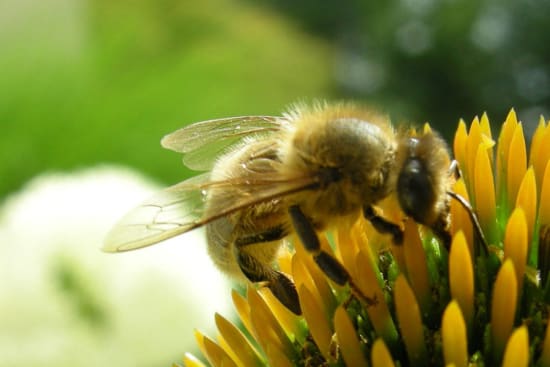
Sustainable, chemical-free bee-keeping, giving the bees the opportunity to make their honey as nature intended, is important here.
Pure, clear, healthy – with plenty of trace elements, vitamins and minerals.
Pure, clear, healthy – with plenty of trace elements, vitamins and minerals.

Strong bee colonies and good relationships with bee-keepers who work in accordance with Bee-Family’s criteria guarantee high quality.
Bee-Family inspects its partners regularly and takes samples from every honey harvest.
The selected batches of honey are sealed, and the samples are tested by recognised institutes such as Agroscope in Liebefeld (CH) for impurities and residues.
These expensive analyses are the guarantee of Bee-Family's high-quality standards.
The selected batches of honey are sealed, and the samples are tested by recognised institutes such as Agroscope in Liebefeld (CH) for impurities and residues.
These expensive analyses are the guarantee of Bee-Family's high-quality standards.

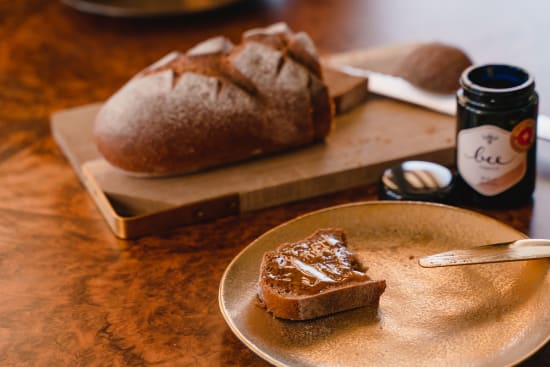





Honey - delicious and healthy
By the way, honey is not only delicious, but also healthy. Studies show that it can relieve cold
symptoms such as coughs and sore throats due to its anti-inflammatory and antibacterial properties.
In addition, many swear by the
calming effects of warm honey milk to help them sleep better. So these are more reasons to like honey.
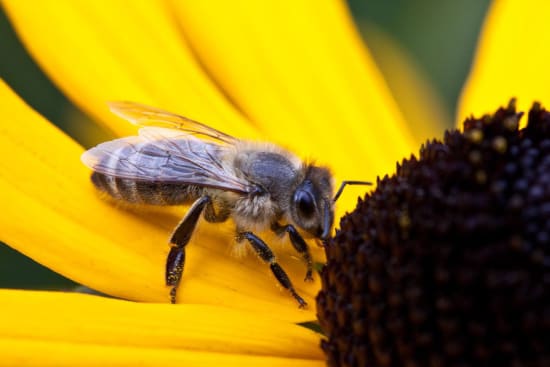
Honey bees - older than mankind
The oldest fossil findings show that honey bees were around 100 million years ago.
Man came on the scene around 2 million years ago. However, it was a long time before he discovered the honey made by wild bees.
Man came on the scene around 2 million years ago. However, it was a long time before he discovered the honey made by wild bees.
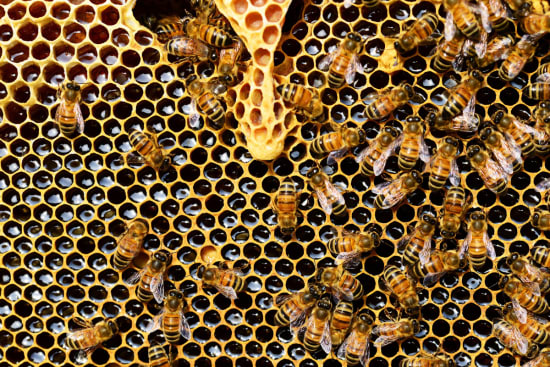
As cave paintings of «honey hunters» show, he used it as food in the Stone Age, but also as bait when hunting bears.
All those years ago, he already knew that honey could be harvested many times in succession from a bee tribe if the nest and the brood are left unharmed.
All those years ago, he already knew that honey could be harvested many times in succession from a bee tribe if the nest and the brood are left unharmed.

When men started to establish themselves in one place, they also started to keep and cultivate bees.
The idea of systematic bee-keeping then spread through trade relationships and
cultural contacts, particularly in the early high cultures of Mesopotamia and Egypt. In Egypt, it even enjoyed a golden age.
Because of the very highly developed apiculture and wealth of archaeological evidence, scientists actually believed for many years that the earliest roots of domestic bee-keeping were in Egypt. However, archaeological excavations in Central Asia prove that it was present in that region much earlier.
Because of the very highly developed apiculture and wealth of archaeological evidence, scientists actually believed for many years that the earliest roots of domestic bee-keeping were in Egypt. However, archaeological excavations in Central Asia prove that it was present in that region much earlier.

Transhumance – bees on board of a boat
Around 4000 BC, the Ancient Egyptians realised that honey production and fruit yields
could be improved by locating bee colonies in areas with intensive agriculture.
However, the idea of “transhumance”, or moving the bees from place to place, was even more sophisticated. In Lower Egypt, entire bee colonies were loaded onto ships in the springtime and transported along the Nile to Upper Egypt. The bees produced large quantities of honey en route and also pollinated cultivated plants along the way.
However, the idea of “transhumance”, or moving the bees from place to place, was even more sophisticated. In Lower Egypt, entire bee colonies were loaded onto ships in the springtime and transported along the Nile to Upper Egypt. The bees produced large quantities of honey en route and also pollinated cultivated plants along the way.

Despite all these efforts, however, the time soon came when the demand for honey could no longer be covered by the domestic
market and honey had to be imported. By this time, honey not only played an important role as a sacrificial offering,
but also in medical remedies, cosmetic products and for sweetening baked goods and wine.
It had a price tag to match. In those days, a pot of honey is said to have been equivalent in value to a donkey or a cow. And the theft of honey was punishable by death.
It had a price tag to match. In those days, a pot of honey is said to have been equivalent in value to a donkey or a cow. And the theft of honey was punishable by death.
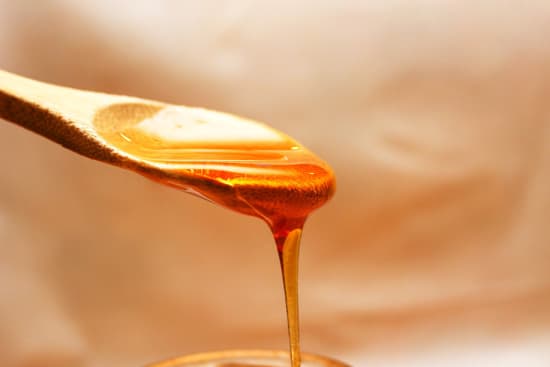
Honey – likes it cool and dark
Ideally, honey should be stored where it is cool and dark and in a dry place free of odours, because otherwise the enzymes and flavours will not be preserved.
That’s why high-quality Bee-Family honey is stored in Miron violetglass, as an excellent protection from light. This offers the optimum protection from changes, and the honey can easily be kept for years without losing its healthy qualities.
That’s why high-quality Bee-Family honey is stored in Miron violetglass, as an excellent protection from light. This offers the optimum protection from changes, and the honey can easily be kept for years without losing its healthy qualities.
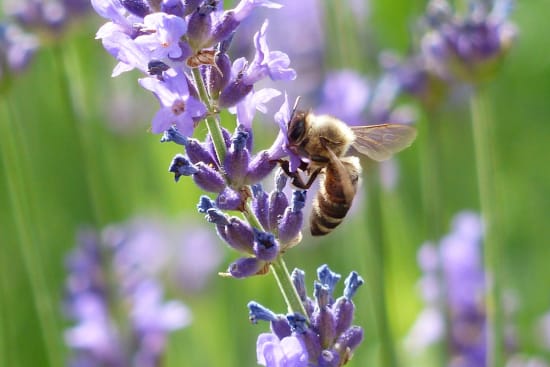
Honey is best for your health when enjoyed cool.
Honey is best for your health when enjoyed cool. When it is heated to more than 40 degrees Celsius, important enzymes are lost, and in a microwave oven the enzyme content drops to zero within seconds. For this reason, honey should never be boiled.
Honey is best for your health when enjoyed cool. When it is heated to more than 40 degrees Celsius, important enzymes are lost, and in a microwave oven the enzyme content drops to zero within seconds. For this reason, honey should never be boiled.

However, warming it briefly when sweetening hot or warm drinks is fine, because drinks cool relatively quickly when consumed.
Tip:
crystallised honey will be restored to its liquid form when warmed gently in a water bath.
Tip:
crystallised honey will be restored to its liquid form when warmed gently in a water bath.

Join the war on bee death
For around ten years now, notable numbers of bee colonies have been dying all over the world. Some years ago, experts reported
that around 100,000 colonies had perished in the past winter in Switzerland alone.
What was the reason? On the one hand, bee death has been connected in the past with parasitic infestations. On the other, increasingly sterile gardens that no longer contain flowers or flowering grasses, shrubs and trees are proving fatal to bees.
What was the reason? On the one hand, bee death has been connected in the past with parasitic infestations. On the other, increasingly sterile gardens that no longer contain flowers or flowering grasses, shrubs and trees are proving fatal to bees.
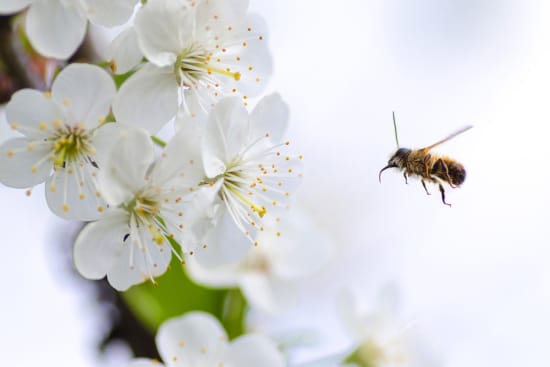
It is important to know that 35% of global food production depends on pollinating insects. That includes all types of fruit.
But around 4000 varieties of vegetables grown in Europe also owe their existence entirely to busy insects.
This demonstrates how important it is for bees to survive. We should therefore do everything in our power to ensure that they find blossoms to give them a continuous supply of food from spring to autumn.
This demonstrates how important it is for bees to survive. We should therefore do everything in our power to ensure that they find blossoms to give them a continuous supply of food from spring to autumn.

This will only happen if we opt to grow more flowering plants.
Let’s remember all the robust, native flowering shrubs such as white or pink hawthorn and blackthorn, not to mention Amelanchier (serviceberry), or dog roses, marguerites, sunflowers, lavender, rosemary, sage and other herbs.
And if you would like take concrete action against bee death, you can also become a sponsor with Bee-Family.
Let’s remember all the robust, native flowering shrubs such as white or pink hawthorn and blackthorn, not to mention Amelanchier (serviceberry), or dog roses, marguerites, sunflowers, lavender, rosemary, sage and other herbs.
And if you would like take concrete action against bee death, you can also become a sponsor with Bee-Family.
More loving & high-quality additional gifts
Gottlieber specialties
Here you will find the story of a woman who developed normal wafers into a speciality and find out what makes our cocoa almonds so special.
Chocolate from Maestrani
Why is chocolate good for morning grouchs? Who paid with cocoa beans? And why do ladybirds bring good luck? Answers to these and other questions can be found here.
Honey from Bee-Family
Want to learn more about an irresistible honey? To dive into the world of honey, honey hunters and bee transhumance and know how to store honey? Read here.
Tea from Gottlieber
Which tea is called «gunpowder»? Which type of tea was picked by monkeys? And how is Moroccan tea made? Answers to these questions and more can be found here.
Red wines Amarone and Ripasso by Albino Armani
Here more about our red wines: the Azienda Albino Armani, a wine made from dehydrated grapes, the «accident» called Amarone and a film that will make you dream.
Prosecco Albino Armani
When may a wine be labelled Prosecco? What is meant by Brut or Extra Dry? Who is Albino Armani? And what can dreams look like? Here you will find the answers.
Prosecco Albino Armani Rosé DOC
What does it taste like? What goes well with it? What does Millesimato or SQNPI mean? And how sustainable is Armani? You can find the answers to these and other questions here.
Teddy bears
More about the «birth» and success story of the cute teddies as well as all kinds of information about teddy bear days, teddy bear records or teddy museums can be found here.



